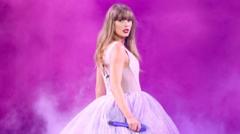Taylor Swift speaks out against being dragged into a legal controversy involving her friend Blake Lively and actor Justin Baldoni, emphasizing her lack of involvement in the film's creative decisions.
Taylor Swift Denounces Legal Summons Tied to Blake Lively and Justin Baldoni Dispute

Taylor Swift Denounces Legal Summons Tied to Blake Lively and Justin Baldoni Dispute
Swift's representatives claim her involvement in court proceedings is merely for sensationalism.
Taylor Swift's legal team has recently criticized a court summons that brings her into a highly publicized legal dispute between Blake Lively and Justin Baldoni. The singer's representatives assert that the summons is a bid for "tabloid clickbait" rather than a legitimate legal matter. At the heart of the issue is the film *It Ends With Us*, which has been embroiled in a sexual harassment case. According to Baldoni, he was invited to Lively's New York home in 2023 to discuss script revisions, during which both Taylor Swift and Lively's husband, Ryan Reynolds, were present.
Lively has accused Baldoni of sexual harassment and launching a smear campaign in a lawsuit filed in December 2024. In response, Baldoni has countersued both Lively and Reynolds, claiming civil extortion, defamation, and invasion of privacy. Tensions mounted over changes to the script, particularly after Baldoni was reportedly surprised to find Swift and Reynolds present during discussions regarding the film's re-write.
Baldoni highlighted a message from Lively, comparing herself to Daenerys Targaryen from *Game of Thrones* and referring to Swift and Reynolds as her "dragons," indicating their protective role. In a show of support, Baldoni replied to Lively expressing appreciation for her contributions. Allegations have also surfaced suggesting that Swift played a part in the casting of actress Isabela Ferrer, who portrayed the younger version of Lively’s character.
Ferrer noted that Swift’s involvement positively impacted her audition process. However, Swift's representatives firmly assert that her role was limited to allowing the use of her song "My Tears Ricochet," and that she had no hand in the film's production or creative processes, having only seen it weeks after its official release while on her global tour. They contend that the summons only serves to exploit Swift's name and distract from the core legal issues at stake.




















